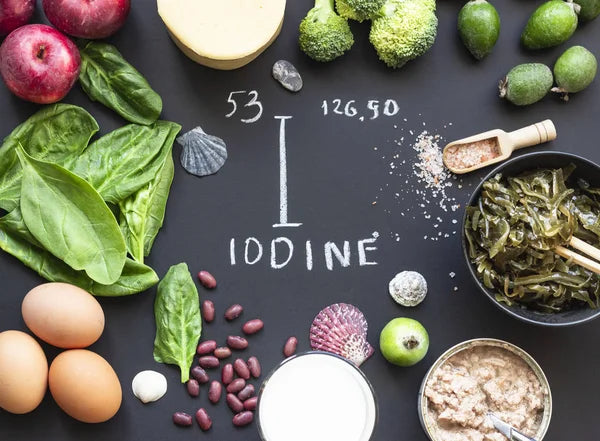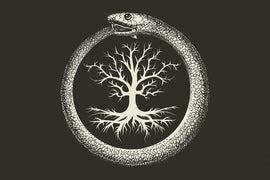What is the Iodine Crisis?
The Iodine Crisis is a book written by Lynne Farrow, a Journalist, College Professor, and Speaker. Her own experience with breast cancer led to the discovery that there has been grand misinformation on a natural mineral (Iodine), with proven benefits for many diseases and cancers. With the help of Dr David Brownstein, she had been able to Journal and write a book about the Hidden Information (and Disinformation) about Iodine.
For years, the medical community has been focused on the importance of essential nutrients such as Vitamin C, Vitamin D, and Omega-3 fatty acids. However, one crucial Mineral & Nutrient that often slips under the radar – iodine. The so-called "iodine crisis" is a growing concern, as many individuals worldwide are experiencing drastic levels of iodine deficiency. Recent research suggests that much higher doses of iodine may be necessary to achieve optimal health, contrary to previous recommendations. In this article, we will explore the iodine crisis, the benefits of higher iodine doses, and how to ensure you're getting enough of this essential nutrient.
Iodine is a vital Mineral required for the production of thyroid hormones, which regulate metabolism, growth, and development. It is responsible for producing T3 and T4, which T3 (Tri-IODO-Thyronine) has 3 Iodine Molecules, and T4 (Tetra-IODO-Thyronine, or Thyroxine) has 4 Iodine Molecules. Iodine is not just needed by the Thyroid, but for other important tissues/organs as well. While the Thyroid primarily utilizes Iodide, other organs such as the Breasts, Ovaries, Prostate, and Testes primarily concentrate Iodine. Studies have shown that iodine deficiency can alter the structure and function of Breast tissue, as well as the Prostate. This can include dysplasia and atypia which are the forerunners for breast or prostate cancer. Research has also shown that Iodine, not Iodide, will decrease lipoperoxidation of healthy breast tissue that occurs from disease/cancer. Large amounts of iodine are also stored in many other areas of the body such as the salivary glands, cerebrospinal fluid, the brain, gastric mucosa, choroid plexus, and ciliary body of the eye.
Tissues including the kidneys, spleen, liver, blood, salivary glands, and intestines can use either form of Iodine/Iodide. Since various organs and tissues respond to different forms of iodine, it is optimal to supplement a combination of Iodine and Iodide.
The iodine crisis refers to the increasing prevalence of iodine deficiency across the world, leading to a range of health issues. According to the World Health Organization (WHO), nearly 2 billion people worldwide suffer from iodine deficiency, with 54 countries considered iodine-deficient. For years, the recommended daily allowance (RDA) for iodine has been set at 150 micrograms (mcg) for adults. This requirement was initially set to prevent Goiter. However, new research and clinical observations suggest that these recommendations may be too low to ensure optimal health, especially considering our modern day toxic environments saturated with Halides that deplete our Iodine levels, thus contributing to the “The Iodine crisis”.
Unfortunately, Iodine is a vital nutrient that seems go very unnoticed in today's world, even in conventional medicine. A few reasons why iodine has been vastly neglected, or even strongly opposed by many Doctors, Pharmacists, and even popular Medical institutions, is because it is inexpensive, can cure most diseases, and/or significantly improve symptoms of disease. In the 1940's, when antibiotics came into vogue as the treatment for most disease, iodine therapy vanished from popular medical vernacular.
A list of some of the therapeutic actions of iodine are: antibacterial, anticancer, antiviral, antimicrobial, antiparasitic, and elevation of body Ph to healthy alkaline levels.
Conditions that can be remedied by iodine supplementation are: ADD, ADD/ADHD, breast disease, overgrowth of yeast, excess mucous production, fatigue, fibrocystic breasts, headaches, migraine headaches, hypertension, liver disease, ovarian disease, carotid duct stones, prostate disorders, thyroid disorders, vaginal infections, and many more common ailments.
As you can see, there are many reasons why Iodine has so much opposition and pushback from Doctors and Medical Institutions who push conventional Medicine. A cured patient is another lost customer.
Thyroid Meds can make your symptoms worse

Usually when individuals discover that they have Hypothyroidism or some form of Thyroid Dysfunction, the first thing they resort to is taking Thyroid medication that is prescribed by a doctor. While this may serve as a temporary fix, this can actually end up causing worse issues in the long run, as your Thyroid Medication may actually make you even more Iodine deficient than you previously were, here is why.
Some Thyroid medications such as Synthroid (Levothyroxine), contain synthetic thyroid hormones that may inhibit the body's ability to absorb Iodine since the Body thinks it has enough Iodine within the Thyroid. Usually full saturation of the Body with Iodine begins with your Thyroid, and other tissues follow immediately after when the thyroid becomes saturated. If the Thyroid is inhibiting Iodine because Synthetic Thyroid Hormone is being given, it will prevent any further absorption of Iodine, and ultimately cause you to be even more deficient than you were previously. Some medications such as Methimazole and Propylthiouracil, work by blocking the Thyroid's ability to uptake Iodine "to prevent Hyperthyroidism". While this may be temporarily effective to reduce excess Thyroid Hormone production, it will also lead to an Iodine Deficiency which is usually the root cause of both Hypothyroidism and Hyperthyroidism.
If thyroid hormone is given to an iodine-deficient patient, the increased metabolic rate due to thyroid hormone will actually increase the body's need for iodine as well as decreasing the ability of the cells of the body to concentrate iodine. If a hypothyroid condition is treated with thyroid hormone and there is also an iodine deficiency present, the use of thyroid hormone will exacerbate an iodine-deficient condition.
In layman's terms, thyroid hormones introduced into the body will raise the body's need for iodine. Just like the Thyroid Glands, the breasts have an advanced mechanism for absorbing and storing Iodine. When there is an iodine deficiency, the breasts and thyroid gland enlarge to compensate for that deficiency. In both cases, iodine deficiency induces hyperplasia, which is a precancerous lesion. This ultimately sets the stage for Thyroid and Breast diseases, including cancer of the thyroid gland, and the breasts.
Why Higher Doses are Necessary
In a state of Iodine deficiency, the body's major storage of iodine occurs in the thyroid gland. When the body becomes iodine sufficient, the thyroid gland will contain 50mg of iodine out of total body iodine of 1,500mg-2,000mg. At iodine sufficiency, the largest amounts of iodine are found in fat tissue and muscle (striated) tissue. Due to the fact that women's breasts are major sites for iodine storage, it is important for women especially to maintain adequate iodine levels to ensure a properly functioning thyroid gland and normal breast architecture. It is also believed that sufficient iodine intake will lower the incidence of breast cancer and help women overcome breast cancer.
All of the glands rely on adequate iodine levels to function properly. Animal studies have shown problems with the adrenal glands, the thymus gland, the ovaries, the hypothalamus and pituitary axis, as well as the entire endocrine system, when there is an iodine-deficient state. In fact, the ovaries are shown to have the second highest concentration of iodine in the body next to the thyroid gland (in Women of course). It is impossible to have a balanced hormonal system without ensuring an adequate iodine intake.
Dr Guy Abraham, one of the world's leading researchers on iodine, has shown that the required daily intake of iodine necessary for maintaining iodine sufficiency is at least 13mg per day (after fully saturating the body, which may take some time loading). At sufficiency, the thyroid gland holds a total of approximately 50mg of Iodine. The thyroid gland needs approximately 6mg/day of iodine for sufficiency. The breasts need at least 5mg of iodine (not including ovaries or Prostate for Males), that leaves 2mg of iodine for the rest of the body. This 2mg is still well above - 14x - the RDA of 150mcg/day of iodine. This would clearly explain why the RDA for iodine is inadequate, and may actually lead to health issues in the long run.
The Benefits of Higher Iodine Doses
An increasing body of evidence supports the idea that higher doses of iodine may be more beneficial than previously believed. Iodine is found throughout the body, with approximately 15-20mg stored in the thyroid of the average adult (not necessarily Healthy). As previously stated, when body iodine levels are sufficient it is said that the thyroid gland can hold up to 50mg of Iodine, and 1,500mg-2,000mg in the entire body!
Some of the key benefits include:
1. Improved thyroid function: Higher doses of iodine can help optimize thyroid function, as the thyroid gland requires adequate iodine to produce essential hormones. When iodine intake is insufficient, thyroid hormone production may decrease, leading to hypothyroidism and its associated symptoms. This can also set a chain reaction of a poor functioning Endocrine and Immune System. Most individuals who suffer from Low Testosterone, end up improving their levels after supplementing with Iodine and improving their Thyroid Health.
2. Enhanced immune system: Iodine possesses antibacterial, antiviral, and antifungal properties, which can help support a healthy immune system. Higher iodine doses can improve the body's ability to fight off infections and illnesses.
3. Reduced risk of fibrocystic breast disease: Women who consume higher amounts of iodine have been found to have a lower risk of developing fibrocystic breast disease, a condition characterized by painful and lumpy breast tissue.
4. Improved cognitive function: Iodine is crucial for proper brain development and cognitive function. Pregnant women with iodine deficiency may give birth to children with cognitive impairments, while adults with low iodine levels can also experience cognitive decline.
5. Prevention of goiter: A goiter is an enlargement of the thyroid gland, often resulting from iodine deficiency. Higher iodine intake can help prevent the formation of goiters and maintain healthy thyroid function.
6. Anti-Cancerous: When Iodine is taken in high doses, atleast 15mg a day, it can bind to other molecules including lipids and proteins. The result of Iodine binding to a fat molecule called lactone results in a fat-like substance known as delta-iodolactone. d-Iodolactone is a key regulator for apoptosis and cellular proliferation of the Thyroid Gland, which can help down-regulate abnormal Thyroid Growth from diseases such as Hashimoto’s or Graves. This also helps stimulate Autophagy/Apoptosis, to break down diseased cells and replace it with Healthy, Newer ones. d-Iodolactone is an anti-cancer substance, and apoptosis refers to the programmed cell death that all of our normal cells have for efficient Autophagy, which is the destruction of damaged, diseased, or redundant cellular components occurring in vacuoles within a cell.
How to Ensure Adequate Iodine Intake
To ensure you're getting enough iodine, consider the following:
1. Consume iodine-rich foods: Good dietary sources of iodine include Kelp, seaweed, seafood, and some dairy products (preferably Raw Dairy). You may also use Iodized Salt as a last resort, but generally is not as effective as adding Kelp or Seaweed to your food, since Iodized Salt is found in extremely trace amounts and is likely vaporized by the time it reaches the store shelf.
2. Take iodine supplements: If you're not getting enough iodine through your diet, consider taking a supplement that contains both Iodine/Iodide. This can help you saturate your tissues daily with a generous dose of Iodine/Iodide so that your body can reverse it’s gene expression and does not have to try functioning with an Iodine Deficiency, which may cause imbalances elsewhere. Speak with your healthcare provider to determine the appropriate dosage for your needs.
3. Monitor your iodine levels: Regularly monitoring your iodine levels can help you and your healthcare provider make adjustments to your diet or supplementation as needed.
-
“The Iodine Crisis” is a significant public health issue that affects millions of people worldwide. By understanding the benefits of higher iodine doses and taking steps to ensure adequate intake, we can work to combat this global health challenge and promote optimal health for all. Always consult with a healthcare professional before making any significant changes to your diet or supplement regimen. For more information regarding the “Iodine Crisis” we highly recommend you read the book “The Iodine Crisis” by Lynne Farrow, which is a Foreword to another book "Iodine: Why you need it, and why you can't live without it" by Dr. David Brownstein.
References:
-"Iodine Why You Need It Why You Can't live Without It", David M. Brownstein M.D. Copyright 2008 Medical Alternatives Press. P26.
-Eskin, B. Different Tissue responses for iodine and iodide in rat thyroid and mammary glands. Biological Trace Element Research. Vol. 49, 1995.
-Aceves, C. Is Iodine a gatekeeper of the integrity of the mammary gland? J. of Mammary Gland Biol. and Neoplasia. Vol.10, No.2. April 2005.
-"Iodine Why You Need It Why You Can't live Without It", David M. Brownstein M.D. Copyright 2008 Medical Alternatives Press. P168-169.
-"Iodine Why You Need It Why You Can't live Without It", David M. Brownstein M.D. Copyright 2008 Medical Alternatives Press. P179-182.
-Delange, F. Werner and Ingbar’s The Thyroid. Lippincott Williams and Wilkins. 2000.
-Koutras, D.A, et al. Effect of small iodine supplement on thryoid function in normal iondividuals J. Clin. Endocr. 24:857-862, 1964.
-Abraham, G. et al. Orthoiodosupplementation: Iodine sufficiency of the whole human body. Original Internist. December, 2002.
-Nolan, L.A, et al. Chronic Iodine deprivations attenuates stress-induced and diurnal variation in corticosterone secretion in female Wistar rats. J. Neuroend. 2000. Dec;12(12);1149-59
-Rodzaevskai, E.B., et al. Age depenent thymus involution in experimental iodine deficiency. Arkh. Patol. 2002 Mar-Apr;64(2):13-6
-Rodzaevskai, E.B. Morphological impairment of oogenesis in experimental iodine-dependent thyroid transformation. Arkh. Patol. 2002. Mar-Apri; 64(2):10-3
-Nolan, et al. IBID. 2000
-Abraham, G IBID. 2002
-Herzel, B. Modern Nutrition in Health and Disease. 1998
-Eur. J. of Endocrine. 132. 735-43. 1995
-Horm. Metab. Res. 26. 465-69. 1994


